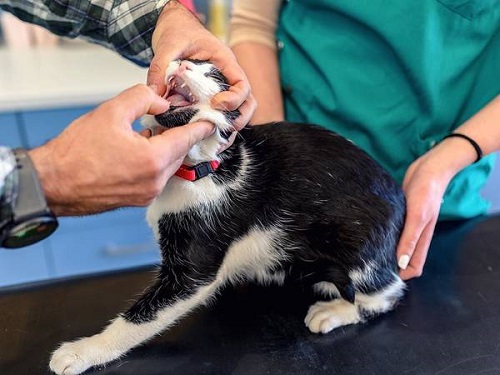Can Cats Get Mono? Find out the truth behind this viral human infection and its impact on our feline companions.
Mononucleosis, often referred to as mono, is a common viral infection in humans, but Can Cats Get Mono? The answer will surprise you. In this informative article, you’ll learn the transmission possibilities and measures you can take to safeguard your pets’ well-being.
Do Tabby Cats Shed A Lot? Find out here
What Is Mono?

Mono, short for infectious mononucleosis, is a common viral infection that primarily affects humans. It is caused by the Epstein-Barr virus (EBV), a member of the herpes virus family. Mono is often referred to as the “kissing disease” because it’s commonly spread through saliva, particularly through close contact such as kissing, sharing utensils, or using the same drinking glass as an infected person.
The symptoms of mono commonly include –
- Fatigue
- Sore throat
- Fever
- Swollen lymph nodes
- Enlarged tonsils
- Rash
- Headache
- Muscle ache
- Loss of appetite
The incubation period for mono is usually 4 to 6 weeks, and the illness can last several weeks or even months. While mono is generally self-limiting, it can cause significant discomfort and fatigue during the recovery period.
Can Cats Get Mono?
Mono has long been considered a human-specific infection, with limited concern for its impact on other animals, particularly cats. However, a study conducted in 2011 shed new light on the subject. The study discovered evidence of the Epstein-Barr virus (EBV) in the blood samples of 38% of cats in Taiwan. This finding challenges the previously held belief and indicates that cats may indeed be susceptible to the virus.
While the reports are still inconclusive and require further research, it is crucial for cat owners to remain vigilant and attentive to any symptoms their cats exhibit. If any concerning symptoms arise, seek professional veterinary care promptly.
Can Cats Get Mono From Humans?

Cat owners naturally care about the well-being of their feline friends and are concerned about the potential transmission of mono to their pets. While it is true that felines can, in rare cases, become infected with mono, do note that such instances are uncommon and isolated.
The transfer of mono to the cats can occur, particularly through direct or indirect contact with human saliva.
What Are The Symptoms Of Mono In Cats?

The symptoms of mono in cats are similar to those in humans.
- Fatigue
- Sore throat
- Fever
- Swollen lymph nodes
- Enlarged tonsils
- Rash
- Headache
- Muscle ache
- Loss of appetite
How To Prevent Mono In Cats?

- Vaccination: Vaccination plays a crucial role in safeguarding your cat’s health and reducing the risk of developing mono. Ensure that your kitty receives timely vaccinations.
- Isolation: When mono is present either in yourself or your cat, implementing proper isolation measures is crucial in curbing the spread of the infection. It is essential to create a separate living space for the affected individuals. Additionally, using separate food and water bowls helps minimize the risk of cross-contamination. Avoiding direct contact with another feline during the recovery period is equally important. By adhering to these isolation protocols, you can effectively prevent the transmission of mono.
- Hygiene Practices: Maintaining proper hygiene practices is vital in minimizing the risk of mono transmission. Prioritize hand hygiene by thoroughly washing your hands with soap and water before and after handling different kitties. This simple yet effective measure prevents the spread of the infection between cats and reduces the likelihood of contamination.
- Stress Reduction: Minimizing stress in your cat’s environment is essential for maintaining a strong immune system and reducing their susceptibility to infections, including mono. Creating a stable and calm living environment is key. Ensure that your cat has a designated space where they feel safe and secure, free from loud noises or sudden disruptions. Regular play and exercise sessions provide mental and physical stimulation, helping to alleviate stress.
- Regular Veterinary Check-ups: Regular veterinary check-ups are vital in maintaining your cat’s overall health, as well as detecting any potential infections or health issues at an early stage. By scheduling routine visits, the veterinarian can conduct thorough examinations, assess your cat’s health, and address any concerns. These check-ups also offer an opportunity for preventive care discussions tailored to your cat’s specific needs. By staying proactive with veterinary check-ups, you can safeguard your cat’s well-being.
Can Cats Get Mono? Quick Takeaways
- Mono, or infectious mononucleosis, is a viral infection primarily affecting humans.
- Recent studies found traces of the mono virus in felines as well.
- Cats can potentially contract mono from humans, although such cases are rare and isolated.
- Symptoms of mono in cats may include fatigue, sore throat, fever, swollen lymph nodes, enlarged tonsils, rash, headache, muscle ache, and loss of appetite.
- Preventive measures for mono-in cats include ensuring vaccinations are up to date, isolating infected cats, practicing good hygiene, reducing stress, and scheduling regular veterinary check-ups.
- It is important to consult a veterinarian for accurate diagnosis, treatment, and prevention strategies specific to your cat’s needs.



